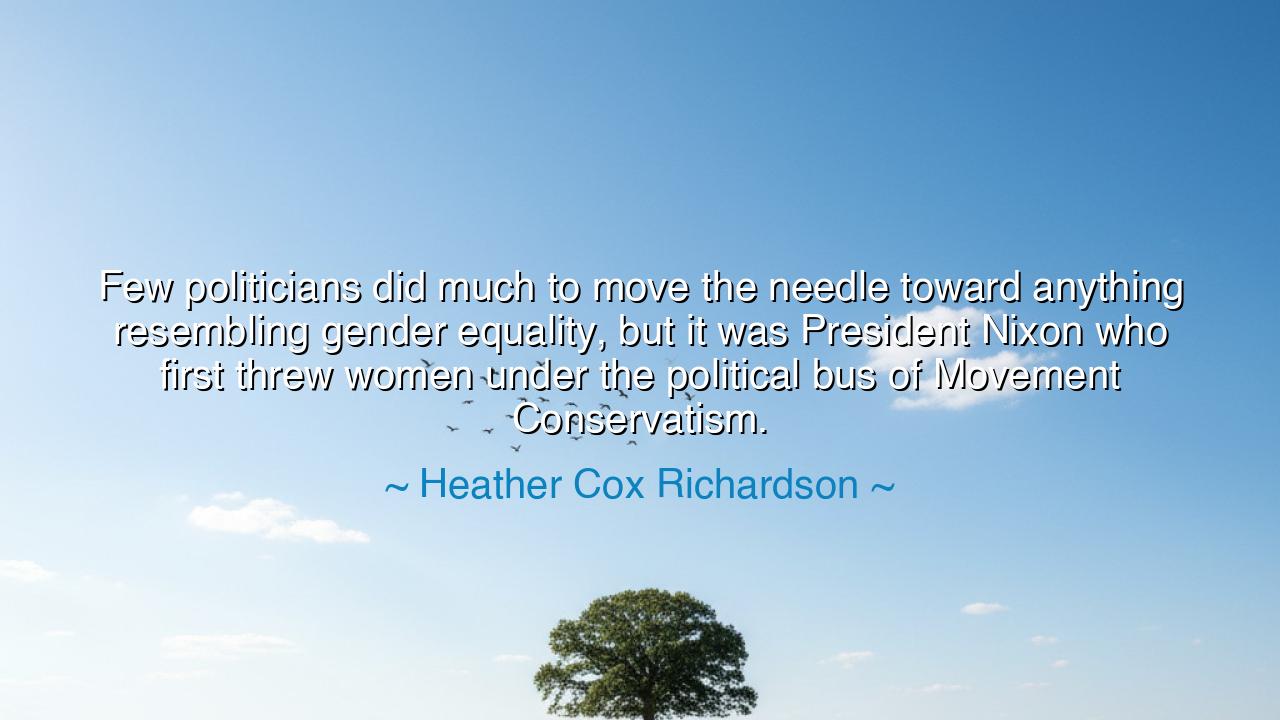
Few politicians did much to move the needle toward anything
Few politicians did much to move the needle toward anything resembling gender equality, but it was President Nixon who first threw women under the political bus of Movement Conservatism.






Hear now the words of Heather Cox Richardson, the historian and truth-teller, who wrote: “Few politicians did much to move the needle toward anything resembling gender equality, but it was President Nixon who first threw women under the political bus of Movement Conservatism.” Her words rise like a lament and a warning, revealing the eternal struggle between progress and power — between the promise of equality and the hunger of politics. Within them lies a truth both sorrowful and instructive: that the path toward justice is rarely blocked by ignorance alone, but often by those who see equality as a threat to control.
In the ancient rhythm of human history, there are moments when the tide of change rises — when voices long silenced begin to speak, and the world trembles at their awakening. The era of which Richardson speaks was one such moment. The 1960s and 1970s were an age of upheaval, when women across the Western world began to demand not charity, but rights — the right to work without discrimination, to govern their own bodies, to share equally in the shaping of nations. Yet as this rising power of women stirred the air, the political world — built upon centuries of male dominance — began to quake.
President Richard Nixon, ever the strategist, saw the growing movement for women’s rights not as a chance to strengthen the moral fabric of the nation, but as a force to be manipulated and restrained. In the dawn of Movement Conservatism, a political wave born of fear — fear of social change, of civil rights, of shifting hierarchies — Nixon and his allies sought to harness the discontent of those who clung to the old order. They promised stability, tradition, and “family values,” but beneath these words lay the decision to sacrifice the equality of women for the preservation of power. Thus, as Richardson declares, he “threw women under the bus” — using them as pawns in a broader game to consolidate a divided nation under a banner of control.
In this act we see a pattern older than any modern government: the betrayal of the vulnerable for the comfort of the powerful. In the time of Cleopatra, when Rome sought to consume Egypt, women of strength were branded as seductresses and threats to order. In medieval kingdoms, queens who ruled were whispered against as witches or usurpers. And in Nixon’s America, as in so many ages before, equality was painted as danger. For power, when threatened, always seeks an enemy — and too often, it finds that enemy in womanhood itself, the eternal symbol of creation, change, and defiance.
But Richardson’s words are not only a condemnation — they are a call to remembrance. For even as politics betrayed the promise of equality, the flame of the women’s movement did not die. It burned in the marches of Gloria Steinem, in the writings of Betty Friedan, in the quiet courage of millions of women who refused to be dismissed. It burned through ridicule, through policy, through the cold indifference of those who thought themselves masters of destiny. And in time, that flame became a light by which new generations could see — a light that revealed both the failures of the past and the work yet unfinished.
Thus, her statement is both history and prophecy. It reminds us that progress is never given; it is fought for, lost, and fought for again. The betrayal of one generation must become the lesson of the next. When leaders trade justice for strategy, it falls to the people to reclaim the soul of their nation. For politics, when divorced from conscience, becomes nothing but theater — and the cost is always paid by those with the least power to resist.
Let the wise, then, take heed of Heather Cox Richardson’s wisdom: guard against those who speak of tradition while silencing equality; beware of those who promise unity through exclusion. For every age has its Nixons — those who cloak fear in the garments of policy. But every age also has its daughters of courage, who rise when others fall silent.
So let the lesson be this: never allow equality to become a bargaining chip. Demand it, defend it, teach it. Speak of fairness to your sons as well as your daughters, and measure your leaders not by their promises, but by the justice of their actions. For when equality is sacrificed to power, freedom itself begins to decay. But when the people rise with open eyes and steadfast hearts, no bus of politics, no movement of fear, can ever crush the truth that all are equal — not by permission of rulers, but by the design of creation itself.






AAdministratorAdministrator
Welcome, honored guests. Please leave a comment, we will respond soon